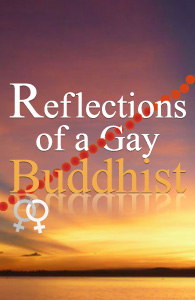I recently made a new friend at a club in KL. She was a young girl who identifies as a butch. We had started chatting and she said she was interested in Buddhism, which of course thrilled me to bits. See, you can find opportunities to share Dharma everywhere! The next day, she came for the Buddhist class at Kechara and has been attending regularly ever since.
Recently, she started talked about furthering her studies overseas. At only 23 years old, her long-term goal was rare for someone as young as her, she said she wanted to leave the suffering in samsara*. So when she announced her plans to leave Malaysia, I tactfully asked her why she wanted to head overseas for study. Was it to seek a new environment to escape her problems?

The concept of preciousness comes from rarity and intrinsic value. To even contemplate how rare our human existence is, Buddha had a parable about an old blind turtle which lives at the bottom of the ocean. This turtle swims up to the ocean’s surface for air once every hundred years. Imagine a golden yoke floating around the seas, never still for a moment. The likelihood of the blind turtle swimming up and putting his head through the hole of the yoke when he comes up for a breath, is the likelihood of our being born as a human being.
But there are so many humans, I have heard people say. However, compared to the billions upon billions of insects, animals, spirits etc, human beings should be considered an extreme minority.
Buddhism provides a comprehensive list of conditions, which allows us to see how precious it is to be born as a human being. It is precious because we have the potential and opportunity to develop ourselves in order to progress out of our current stress and unhappiness.
We can see how lucky we are by reflecting that we are born in a place and time where we have access to Buddha’s teachings and people are practising the Dharma. We are relatively healthy and we can choose our life philosophy or religion freely. Finally, people have love in their hearts for others.
We are also very fortunate not be born in the hells, or as a hungry ghost, or an animal. Ironically, we are also free from the god** and demi-god realm, where we would not be inclined to practice Dharma as we would have continuous pleasures so we do not even consider improving our situation. We have a conscience about good and bad and we’re generally sane.
If we had any conditions contrary to the above, i.e. having mental illness, being tortured, having no access Buddhist teachings, not having religious freedom etc., we would not be able to practise Dharma even if we wanted to.
The fact is that we are so fortunate to have this human rebirth, to have met the Dharma and have a roof over our heads, food on our tables, good health – which sets up a wonderful environment to learn and practise Dharma, hence we should not waste it.
I really hope my new and sweet butch friend will seriously think what she wants to do with her life. The karma to experience Dharma is open but will she walk in?
No matter how old or young we are, I think we need to be constantly aware of what we’re doing in our lives and to contemplate our everyday activities is in synch with our long-term goals – which is to stay happy.
As H.E. Tsem Tulku Rinpoche says, “Yes to friends, to lovers, to business meetings! Yes to dinners and parties! Yes to dates, drinks, entertainment, watching TV, eating, shopping! But when something is wrong - Friends and lovers leave. Parties end. Shopping is temporary therapy and could potentially lead to debts! Yes, we NEED businesses and money but how much is enough? Dinners are lovely but what does that lead to?
At the end of this, we could feel a deep sense of loneliness, senselessness and purposelessness. Not because we are bad, but because we’ve been focusing too much for too long on the wrong agendas to happiness.”- an edited quote from If Not Now, When?
*The six realms are the six states of existence, which are divided into the three lower realms of hell realm, spirit realm and animal realm, and the three higher realms of human, gods and demi-gods.
**In Buddhism, gods are not the omnipotent creator as in the Abrahamic religions. God and demi-god realms are within samsara, which means that they are still subject to the laws of cause and effect, and they are not immortal. Although gods may live for extremely long periods of time, eventually they will die and when they do die, they suffer tremendously. Therefore, in Buddhism, it is not a positive aspiration to be born in the god or demi-god realms.
Sharon Saw is a writer / editor at Kechara Media & Publications, which focuses on publishing the teachings of H.E. Tsem Tulku Rinpoche, a high incarnate Lama of the Tibetan Buddhist tradition. This column will appear every other Friday.
